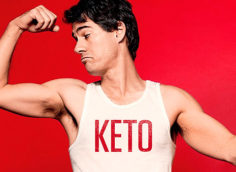At first glance, protein powder from grass-fed cows sounds like a great idea. It's bound to be healthy, right? Sure, more essential fatty acids, no antibiotics, and no bovine growth hormones to make weird tumors sprout from your body. And forget about sprinkling it around the floorboards to kill vermin because it's also pesticide free.
But getting all jazzed up about grass-fed or organic protein powders is like getting jazzed up about an astronomically priced new toaster made by Elon Musk of Tesla because it's electric. You bring it home feeling all high-techy but your 8-year-old shoots you down by asking, "But aren't all toasters electric, Dad?"
Yeah, they are, Junior, and by the same token, virtually all legitimate, quality protein powders are antibiotic free and pesticide free, just like grass-fed, organic varieties. And the alleged abundance of essential fatty acids and lack of bovine growth hormones found in grass-fed protein powders? They're also a non-issue.
Isolating whey is a delicate, laborious process. You have to effectively separate out and concentrate individual whey components while removing almost all fat and fat residues. That process removes any potential contaminants like antibiotics and even pesticides.
This is also true of micellar casein, the gold standard of proteins. It's produced through microfiltration, a process that, while allowing whey protein, lactose, and the large-size micellar casein globules to pass through delicate membranes, filters out contaminants.
The end result is a product as clean as any grass-fed, organic protein powder, so it's ridiculous to shell out more money for grass-fed versions that are likely riding high on the aura of purity and health associated with all things grass-fed and natural rather than science.
It's true that milk from grass-fed cows has a better fatty-acid profile than milk from corn or grain-fed cows. A 100-gram sample of milk from grass-fed cows contains about 32 mg. of omega-3 fatty acids, compared to the 19.8 mg. of essential fatty acids found in regular milk.
That's a difference of 12.2 mg. of omega-3 fatty acids, which is negligible, but dietitian Sean Casey has taken it even further. He points out that in the processing of standard whey protein, manufacturers take out almost all the fat, leaving maybe about 2 grams per serving.
Using a little math, he calculates that the average 25-gram serving of protein from the milk of grass-fed cows would contain roughly 8 mg. more essential fatty acids than an equivalent amount of protein powder derived from conventional cows.
If you consider that a serving of high-quality, concentrated fish oil capsules contains over 3,000 mg. of essential fatty acids, 8 extra mg. of essential fatty acids is hardly enough to thump your chest about. Paying extra for grass-fed protein is pointless.
It's true that dairy farmers often inject cows with bovine somatotropin (bST, aka bovine growth hormone) to increase milk production, but there are two big things to consider here.
First of all, cows produce bST naturally, and the levels of bST found in milk range from zero to 10 parts per billion, but more importantly, the levels of bST found in the milk of cows treated hasn't been found to be any higher than levels found in cows not treated with it.
But even more importantly, bST is a big, honkin' polypeptide chain. If it were a chain of railway cars instead of amino acids, you'd be mind-numbingly stuck at the train crossing listening to Bjork's greatest hits for about a half hour.
What I'm getting at is that in order for this huge molecule to have any biological effects in you, it would first have to survive the processing of the protein powder intact. But even if it did survive processing and make it to your digestive system, your digestive system would cleave it up into its constituent amino acids. Ergo, no ill effects to you, just added protein.
So don't fret about bovine somatotropins. Unless a dairy farmer mistakes you for a Holstein and injects some into your flank, you're not going to be exposed to them.
There's virtually no nutritional difference between casein or whey derived from the milk of grass-fed cows or regular ol' Joe cows. And the idea that grass-fed or organic protein powders are somehow more pure or healthier than non-grass fed or non-organic is just hype. Don't pay extra when you don't have to.




